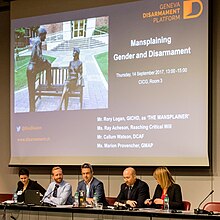Menspleyning

Menspleyning – bu ayollarga erkaklar tomonidan biron bir narsa yoki hodisani haddan tashqari soddalashtirilgan va kamsituvchi uslubda sharhlab berish yoki tushuntirish degan maʼnoni anglatuvchi atama[3][4][5][6].
Oʻzining dastlabki qoʻllanishida menspleyning erkaklarning ayollarga nisbatan qiladigan kamsituvchi harakatlaridan farq qilar edi, chunki bu tushuncha erkak ayoldan koʻra koʻproq bilimli boʻladi degan tushunchaga asoslangan[7]. Biroq, u keyinchalik kengroq qoʻllanila boshladi. Bu atama biror kishi boshqa biron kishiga yoshi va jinsidan qatʼiy nazar, nimanidir tushuntirishda kamsituvchi ohangni ishlatganda qoʻllanadi: „menspleyning“ har qanday kishiga nisbatan, jinsidan qatʼiy nazar ishlatilishi mumkin[8].
2013-yilda Dictionary.com oʻz lugʻatiga mansplain va -splain soʻzlarini qoʻshayotganini eʼlon qildi[9]. Uning eʼlonida shunday deyilgan: „bu atamaning “splaining" qismi 2013-yilda birlashtiruvchi shakl (yoki oʻzak) sifatida juda ajoyib ekanligi isbotlandi.“ Ushbu qism Mansplaining, womansplaining, whitesplaining, rightsplaining[10], goysplaining[11] va Damonsplaining kabi parallel konstruktsiyalarning yaratilishiga sabab boʻlgan[12][13].
Bu soʻz ommalashib borgani sari bir qancha tadqiqotchilar har xil insonlarning turlicha oʻzlashtirishi soʻzning asl maʼnosini yoʻqotishiga sabab boʻlayotganidan shikoyat qilishgan[14]. Joshua Sealy-Harrington va Tom McLaughlin The Globe and Mail gazetasida bu atama munozaralarni toʻxtatish uchun ad hominem (falsafiy argument) sifatida ishlatilayotganligini yozgan[15].
Manbalar
[tahrir | manbasini tahrirlash]- ↑ Anon. „Classmates, San Antonio, Texas by Paul Tadlock“. atlasobscura.com. Atlas Obscura (2018). — „What was meant as an innocent piece of art has earned a reputation as the 'mansplaining sculpture.'“. Qaraldi: 2021-yil 27-iyun.
- ↑ Salazar. „UIW Statue Gets National Attention Thanks To Feminism And Twitter“. San Antonio Current (2015-yil 28-may). — „The bronze statue is called 'Classmates,' and was sculpted by SA artist Paul Tadlock, according to the Times. But it's now known as 'Mansplaining The Statue,' thanks to people on the internet […].“. 2021-yil 27-iyulda asl nusxadan arxivlangan. Qaraldi: 2021-yil 27-iyun.
- ↑ „mansplain“. Dictionary.com. — „[T]o explain something to a woman in a condescending, overconfident, and often inaccurate or oversimplified manner, typically to a woman already knowledgeable about the topic[.]“.
- ↑ „History of Mansplaining“. Merriam-Webster.com. — „It's what occurs when a man talks condescendingly to someone (especially a woman) about something he has incomplete knowledge of, with the mistaken assumption that he knows more about it than the person he's talking to does.“.
- ↑ Steinmetz, Katy (18 November 2014). „Clickbait, Normcore, Mansplain: Runners-Up for Oxford's Word of the Year“. Time. Qaraldi: 24 November 2014. „[T]o explain something to someone, typically a man to woman, in a manner regarded as condescending or patronizing.“
- ↑ Zimmer. „Tag, You're It! "Hashtag" Wins as 2012 Word of the Year“. Visual Thesaurus (2013-yil 5-yanvar). — „[W]hat happens when a man condescendingly explains something to female listeners[.]“. Qaraldi: 2014-yil 30-oktyabr.
- ↑ Jaschik, Scott. „Calling Out Academic 'Mansplaining'“. Inside Higher Ed (2012-yil 16-oktyabr). „[S]ome men explain things to women with condescension, frequently ignoring the reality that the women may already understand whatever is being explained (in many cases, better than do the men).“.
- ↑ „History of Mansplaining“. Merriam-Webster.com. — „It's what occurs when a man talks condescendingly to someone (especially a woman) about something he has incomplete knowledge of, with the mistaken assumption that he knows more about it than the person he's talking to does.“.
- ↑ Solomon. „Word Watch 2013: -splain“. Dictionary.com (2013-yil 6-dekabr). — „The possibilities are seeming endless on the -splain front. This gives Dictionary.com reason to believe that -splain is not just a temporary fad, but rather a stable new addition to English along with its libfix cousins like -gate, -pocalypse, and -zilla.“. Qaraldi: 2014-yil 24-noyabr.
- ↑ Zimmer, Benjamin; Carson, Charles C. (2013). "Among The New Words". American Speech 88 (2): 196–214. doi:10.1215/00031283-2346771. http://americanspeech.dukejournals.org/content/87/2/190.full.pdf+html.
- ↑ Marcus, Marcus (March 30, 2015). "The Art of Goysplaining". The Forward. https://forward.com/life/217607/the-art-of-goysplaining/. "Goysplaining is an outgrowth of people thinking that they know a lot about Judaism. […] The people who goysplain think that because they went to the trouble of reading an article, watching a documentary, or Googling something, they now understand an entire faith and should be congratulated for it."
- ↑ „'Damonsplaining': Matt Damon accused of insensitivity“. BBC News (2015-yil 16-sentyabr). — „One user defined the term as '#Damonsplaining – over talking and/or shouting down a person of colour to explain something about their own race or culture'.“.
- ↑ Moyer, Justin Wm.. „Matt Damon has more 'Damonsplaining' to do — this time about alleged anti-gay comments“. The Washington Post (2015-yil 29-sentyabr). „Damon later walked back what was sarcastically hash-tagged 'Damonsplaining,' saying he believes 'deeply that there need to be more diverse filmmakers making movies.'“.
- ↑ Hart, Benjamin. „RIP "mansplaining": How the Internet killed one of our most useful words“. Salon (2014-yil 20-oktyabr). Qaraldi: 2014-yil 30-oktyabr. „But along the way, mansplaining has morphed from a useful descriptor of a real problem in contemporary gender dynamics to an increasingly vague catchall expression that seems to be inflaming the Internet gender wars more than clarifying them.“.
- ↑ McLaughlin, Tom; Sealy-Harrington, Joshua. „Arguments should not be silenced because of their author's race or sex“. The Globe and Mail (2014-yil 15-aprel). „The use of terms such as 'mansplaining' (and its racial counterpart, 'whitesplaining') can cause disengagement. […] Without such engagement, these terms become unconstructive ad hominem attacks that sidestep meaningful debate when an opponent conveniently possesses privilege.“.
